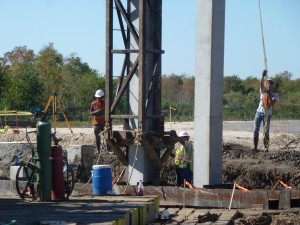In Texas, Confidence that Tar Sands Crude Will Find a Way to the Gulf
Rail is being laid to bring oil in an out of the planned GT Omni Port in Port Arthur, Texas.
After the White House’s announcement that it would delay a decision on the construction of the Keystone XL pipeline from Alberta, Canada to Texas, the airwaves filled with competing voices.
Actor Robert Redford lauded President Obama. Alberta Premier Alison Redford toured Washington D.C. expressing confidence in the project, and the group that’s building the pipeline announced plans to find an alternate route through Nebraska.
But on the Gulf Coast of Texas, there was a sound that may be even louder than the media din: the sound of a pile driving hammer, slamming 85 foot concrete pilings into the earth.
It’s part of construction for a new 1,116 acre port called GT OmniPort, with ship, rail, pipeline and truck access to handle an expected increase in oil flowing through the city.That oil could come from a domestic drilling as well as Canada.
Despite the Keystone XL delay, construction will continue at GT OmniPort.
Bart Owens, the general manager of GT Logistics, is overseeing construction. To explain why he thinks the port is a winning investment he points to the horizon.
“If you look over to the southeast you see Valero’s Port Arthur Facility, about seven miles to the East of here is Totals Port Arthur Facility, so there’s a lot of refining capacity, up to the north about 12 miles is Exxon Mobile.”
Owens says there’s refining in Texas and oil from Canada that will need refining.
Does Delay Make a Difference?
Environmentalists welcome the delay.
“I think if you look at the route, and look at it closely. There may be a time when you say. Hmm, ‘does this really make economic sense?’” said Jim Marston, director of the Texas office of Environmental Defense Fund.
But many say the delay itself does not impact the bottom line for those who want to move Canadian crude to the Gulf.
“No, it does not! Not with oil at prices we’re likely to see at 80 to 100 dollars a barrel. This is quite economic, that’s why it’s likely to move forward,” said William Fisher, a professor at the Jackson School of Geo Science, at UT Austin.
Fisher adds that tar sands oil is of the dirty, heavy hard-to refine variety. That’s one of the reasons it’s disliked so much by environmental groups. But it’s also exactly the kind of oil Texas is good at refining. Texas refineries processed heavy Mexican and Venezuelan oil. But, recently, those supplies began dwindling.
“With those going down, the Canadians would match up very nicely with that refining capacity for heavy oil,” said Fisher.
Pipeline Politics
In the U.S. oil is more than big business, there are politics involved. The president has been accused of punting in an election season– Canada is threatening to sell its crude to China. Fisher worked with both the Ford and Reagan administrations.
Politics play heavily in a lot of deals, particularly when there is some controversy here,” said fisher.
That’s why the Environmental Defense Funds Marston says he’s not breaking out the champagne.
“I’m not jumpin’ up and down and high fiving anybody. I think it’s the administration responding to a lot of technical objections,” said Marston.
Even on a Mule
Ironically, the delay may end up meaning the most to oil companies competing with the Keystone XL pipeline. Just this week Canadian pipeline company Enbridge announced its plan to use existing lines to bring crude into Texas. An announcement that wouldn’t surprise Bart Owens, back in his office in Port Arthur.

A crew hammers 85 foot long cement pilings into the ground at the site of the future GT OmniPort. Photo by Mose Buchele.
“They’re gonna bring crude oil to Port Arthur no matter how they get it here,” Owens said. “It could be on a 400,000 barrel ship, it could come by unit train. Or, if they had to, they could probably pull it by mule on a cart. But they’re gonna get it to Port Arthur and put it in these refineries.”
Owens plans to start moving oil through GT OmniPort by spring 2012.






